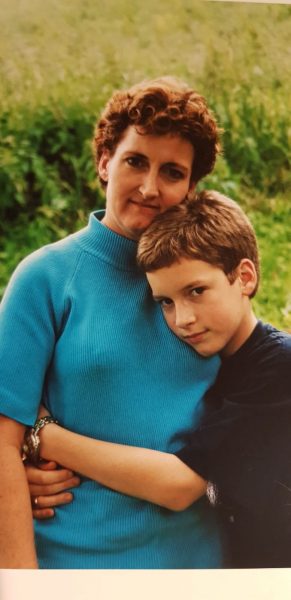I often wondered why Erik was such an enigma. He was brought up in a loving and nurturing environment with endless opportunities to thrive. He was surrounded by so many friends who loved him. He was exposed to wonderful adventures, hobbies and destinations. So, why did he feel so lonely all the time? Why did nothing satisfy him for very long? Why did he avoid any attempt to develop a career? Why did he shirk all responsibility?
The other side of this riddle of a man was polar opposite to his darker side. He was so loving, so creative, so clever with his hands, so willing to sacrifice for those he loved and even those he barely knew. He was never petty or jealous. In fact, the wins and attainments of others gave him a great deal of happiness. I’ve never heard him say a mean word about anyone. He didn’t have a single judgmental bone in his scrawny little body.
Now that he’s on the other side with a broader, deeper perspective, I asked him questions that I hoped would solve the mystery that is this wonderful soul.
‘What past lives were most significant to the issues you had this last lifetime, Erik? Oh, and which past lives helped develop the strengths and gifts you demonstrated this last lifetime, too?’
“Okay, two different questions there, right?” asked Kim.
‘Yeah,’ I reply.
“World War II. Concentration camp. I was a Jewish prisoner working in the crematorium.”
“Oh, boy!” Kim exclaims.
‘Ew,’ I utter under my breath.
“I was from Poland.”
‘Okay,’ I say.
“I was told that my mother and sister and father would live if I worked at the crematorium. That was the incentive for me to work hard there. But I found out later that my family was gassed when they first got there.”
‘Oh! That’s horrible, Erik,’ I say sympathetically. ‘So, what negative issues did that cause for you?’
“Feeling powerless. Feeling manipulated. Feeling like I was treated like an animal. It made me have huge self-worth and self-esteem problems. It also made me have problems completing things. You know, I started things in that lifetime, but I wasn’t able to complete anything,” he says.
As I think back on Erik’s life, I can see so clearly why he so desperately wanted respect, particularly from his father. He wanted freedom, autonomy, independence, but, as the next lifetime he discusses elucidates, he feared any responsibility that would hand him these things on a silver platter.
‘Because completing things were…’ I start.
“…Denied to me because I was sent by the Nazis to Auschwitz,” he interjects.
‘And because you weren’t able to complete your goal of ensuring the survival of your family…’ I add.
“That too. Exactly, exactly. And there was another lifetime too when I was in the Middle Ages in Eastern Europe. I was in an army fighting against Vlad the Impaler in Transylvania. I was one of the heads of the army. I had been drinking, and I made a foolish choice because I was so hung over. So my army was captured, and they were all impaled on stakes because of me,” he says with a subdued tone.
‘Ew!’ I exclaim.
“Yeah and I had such a horrible regret,” Erik adds.
‘What issues did that create for you?’ I ask.
“Unable to complete my destiny. Addiction.”
I thought how ironic it all was: just like that past life, Erik was unable to complete his destiny in his most recent one. Sad.
After a short pause. Kim says, “I’m just listening to him right now, Elisa.”
Erik continues: “I had lots of opportunities that I pissed away. And I felt the fate of all of my men in such a gruesome, terrible way and to know I was responsible for that, to hear them crying and screaming and dying.”
What a terrible cross to bear. My poor baby boy. No wonder he created so much pain for himself.
‘Did that make you have responsibility issues, Erik?’ I ask.
“Shit yeah. I was afraid to have any responsibilities. I knew I had fucked up, and I was afraid I would fuck up other people’s lives too. That’s why I felt like I fucked up everything I did in my last lifetime.”
Sadly, I remember he always used to say these very words when he was alive. It felt like a dagger in my heart then. It feels like a dagger in my heart now.
In an effort to lighten the somber mood a bit, Kim prompts Erik to answer the next question: “What about the lifetimes that helped you accrue your gifts, talents, and abilities?”
“Oh God,” he says proudly. “I’ve been an artist, a carpenter, an architect, a philosopher, an author, a speaker, someone who has worked in government to make the community a better place, to change laws…”
‘We know you had so many gifts in your most recent life, Erik. Which of these were products of those lifetimes?’ I ask.
“Well, you know I was good with my hands and I was creative. And I could be pretty charming. Also my intelligence, my openness, my willingness to listen to other people, my sense of humor, my desire for everyone to have abundance. You know what I’m really most proud of?”
‘What, Baby?’ I ask, expectantly.
“I was not able to feel any kind of envy or jealousy. I was happy when anyone did cool shit, had cool shit, I was always happy about that. There was never any kind of envy inside of me. Boy or boy, I’ve seen that over and over how that fucks people up!”
‘Yes, oh, God!’ I agree.
“And, Mom, it’s funny because usually what they envy is not what they’re supposed to have anyway!”
‘Uh, huh!’ I say.
“You know, that is so true, Erik!” Kim chimes in.
“That’s interesting!” I add.
“I’ve had thousands of past lifetimes and those two I talked about are the ones that brought painful issues I needed to work through.”
These series of questions left me filled with sorrow. No mother wants her child to suffer. In this case, Erik’s suffering had roots in other lives, but he failed to use that adversity, as atrocious as it was, to heal, to resolve those issues that had plagued him for centuries. Again, he denied himself opportunities, he turned his back on his destiny, he cowered in the face of responsibility, and he always felt he couldn’t do anything right. I believe that’s why he chose to shoot himself rather than swallow a bunch of pills. He was afraid to survive a failed overdose as a permanent invalid. Erik was determined to get this one right. Oh, how I wish he had channeled this determination elsewhere. That moment when he held the gun to his temple was not the time to turn over a new leaf. I miss him so.



